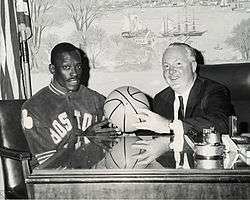Satch Sanders
 | |
| Personal information | |
|---|---|
| Born |
November 8, 1938 New York City, New York |
| Nationality | American |
| Listed height | 6 ft 6 in (1.98 m) |
| Listed weight | 210 lb (95 kg) |
| Career information | |
| High school |
Seward Park (New York City, New York) |
| College | NYU (1957–1960) |
| NBA draft | 1960 / Round: 1 / Pick: 8th overall |
| Selected by the Boston Celtics | |
| Playing career | 1960–1973 |
| Position | Power forward |
| Number | 16 |
| Career history | |
| As player: | |
| 1960–1973 | Boston Celtics |
| As coach: | |
| 1973–1977 | Harvard |
| 1978 | Boston Celtics |
| Career highlights and awards | |
| |
| Career statistics | |
| Points | 8,766 (9.6 ppg) |
| Rebounds | 5,798 (6.3 rpg) |
| Assists | 1,026 (1.1 apg) |
| Stats at Basketball-Reference.com | |
| Basketball Hall of Fame | |
Thomas Ernest "Satch" Sanders (born November 8, 1938) is an American retired college and professional basketball player and coach. He was a 6'6", 210 lb power forward. Sanders is tied for third for most NBA championships in a career, and is one of three NBA players with an unsurpassed 8–0 record in NBA Finals series outcomes.[1] On April 4, 2011, it was announced that Sanders was elected to the 2011 class to enter the Naismith Basketball Hall of Fame as a contributor.
Biography


After playing at New York University as a stand out collegian he spent all of his 13 years in the National Basketball Association (NBA) with the Boston Celtics, being part of eight championship teams in 1961–66, 1968 and 1969. In NBA history, only teammates Bill Russell and Sam Jones have won more championship rings during their playing careers. He ended his career in 1973.
Following his playing career Sanders became the basketball coach at Harvard University, a position he held until 1977. Sanders became the first African-American to serve as a head coach of any sport in the Ivy League.[2] In 1978, Sanders became the head coach of the Boston Celtics, taking over for former teammate Tommy Heinsohn. Sanders returned the following season; however after a 2–12 record he was replaced by Dave Cowens, who took on the role as a player-coach.
See also
References
External links
- BasketballReference.com: Satch Sanders (as coach)
- BasketballReference.com: Satch Sanders (as player)